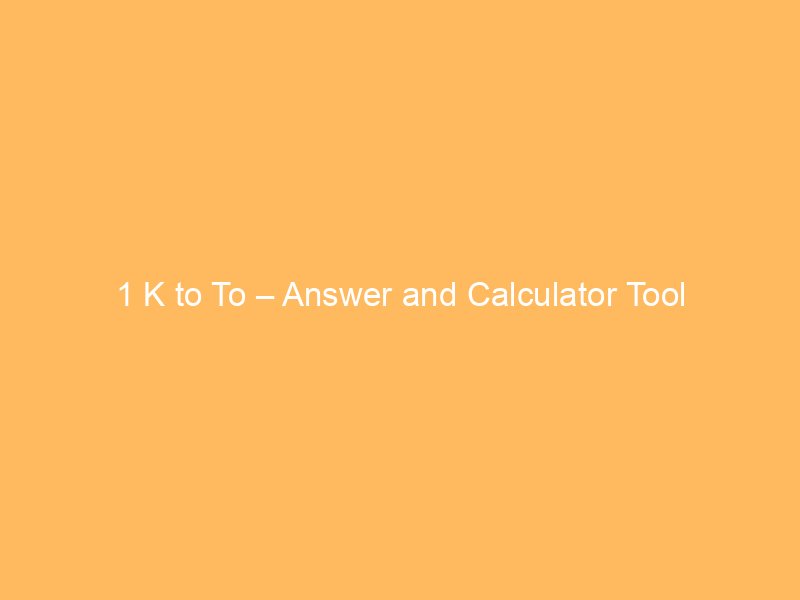The result of converting 1 k to to is approximately 1000 to.
Since 1 kilo (k) equals 1000 to, multiplying 1 by 1000 gives the total in to. This means if you start with 1 k, you get 1000 to. The conversion is straightforward because the kilo is a larger unit, and to is a smaller unit, making the conversion a simple multiplication by 1000.
Conversion Result
1 k is equal to 1000 to, based on the conversion factor between these units.
Conversion Tool
Result in to:
Conversion Formula
The formula to convert k to to is simple: multiply the number of k by 1000, because 1 k equals 1000 to. For example, if you want to convert 2 k to to, you multiply 2 by 1000 which equals 2000 to. This works because the units are directly proportional, with 1 k being 1000 to.
Conversion Example
- Convert 3 k to to:
- Step 1: Take 3 as the value in k.
- Step 2: Multiply 3 by 1000 (since 1 k = 1000 to).
- Step 3: 3 x 1000 = 3000 to.
- Result: 3 k equals 3000 to.
- Convert 0.5 k to to:
- Step 1: Use 0.5 as the value in k.
- Step 2: Multiply 0.5 by 1000.
- Step 3: 0.5 x 1000 = 500 to.
- Result: 0.5 k equals 500 to.
- Convert 10 k to to:
- Step 1: Use 10 in k.
- Step 2: Multiply 10 by 1000.
- Step 3: 10 x 1000 = 10,000 to.
- Result: 10 k equals 10,000 to.
Conversion Chart
This chart shows some values from -24.0 to 26.0 in k and their equivalents in to. It helps you see the relationship at a glance and makes quick conversions easier.
| k | to |
|---|---|
| -24.0 | -24000 |
| -20.0 | -20000 |
| -15.0 | -15000 |
| -10.0 | -10000 |
| -5.0 | -5000 |
| 0.0 | 0 |
| 5.0 | 5000 |
| 10.0 | 10000 |
| 15.0 | 15000 |
| 20.0 | 20000 |
| 25.0 | 25000 |
| 26.0 | 26000 |
Related Conversion Questions
- How many to are in 1.5 k?
- What is the value of 0.75 k in to?
- How do I convert 2.5 k to to?
- Is 10 k equal to 10,000 to?
- Can I convert negative k values to to?
- What is 100 k in to?
- How do I quickly convert 5 k to to without calculator?
Conversion Definitions
k
The unit “k” stands for kilo, which equals 1000 units of a measurement. It is commonly used to denote thousands of items, quantities, or units in various fields like weight, distance, or data storage, depending on context.
to
The unit “to” is a smaller measurement unit, often representing a subdivision of larger units, with 1000 to equaling 1 k in many contexts. It helps to express quantities more precisely, especially in calculations involving large or small measurements.
Conversion FAQs
How do I convert k to to manually?
To convert k to to manually, multiply the number of k by 1000, because 1 k equals 1000 to. For instance, 4 k multiplied by 1000 gives 4000 to, which is the equivalent in to.
What is the most efficient way to calculate multiple k to to conversions?
Using a calculator or a conversion tool simplifies the process. For quick mental math, remember that each k is 1000 to, so multiplying the number of k by 1000 gives the total in to directly.
Can the conversion factor change depending on context?
Yes, the conversion factor can vary based on the specific measurement system or field. Always verify the units’ definitions in your particular context to ensure correct conversions.
Is there a difference between converting to in different industries?
Yes, in some fields, “to” might represent different quantities or units, so always check the specific measurement definitions used in your industry before converting.



